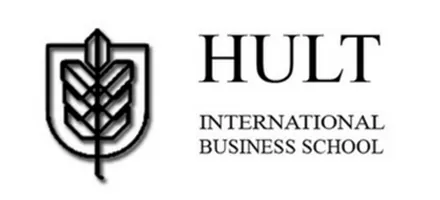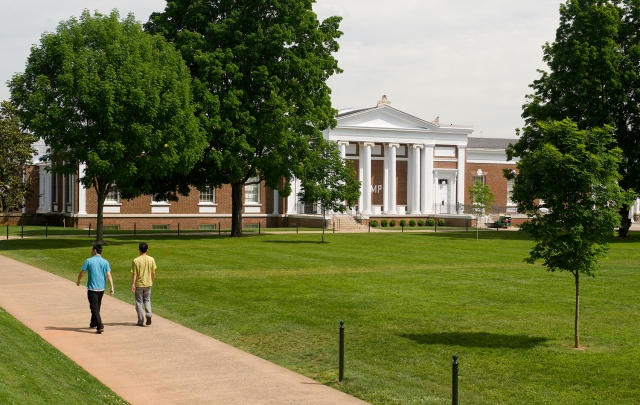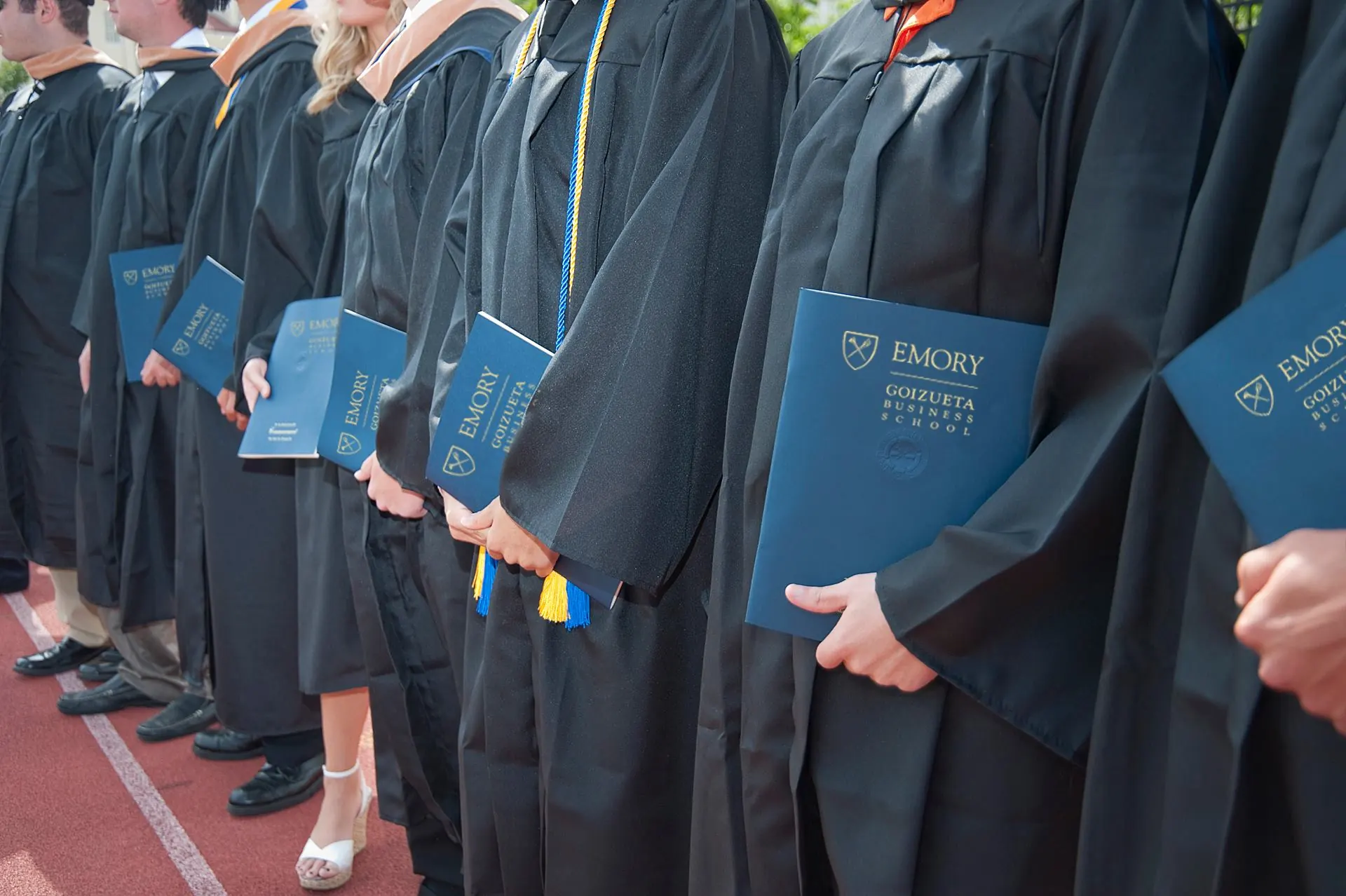University of Virginia, McIntire School of Commerce
You’d be hard-pressed to find a business school having a better streak than the McIntire School of Commerce. Over the past five years, average base salaries for graduates have risen by nearly $10,600, with placement hitting 98% in three of those five years (including 2018). While McIntire grads are landing jobs at a blistering pace – with starting pay packages hitting $80,842 no less – the long-term prospects of McIntire business majors are even better. The school ranked first among all business schools in ROI over five years, with grads grossing $241,742 after debt is factored into the equation. On top of that, 97% of McIntire grads landed the jobs they wanted.
Is it any wonder the program ranked 2nd overall in P&Q’s latest undergraduate business school ranking?
Not only that, McIntire climbed over former #1 Washington Olin to claim that spot. Better yet, the school’s composite score of 282.01 nearly beat out Wharton, which topped all comers for the second year straight at a 284.27 score.
Here’s one more item to consider: Just two years ago, McIntire ranked 8th.
A juggernaut in the works? Technically, McIntire has always been in the conversation as one of the top business schools even before the P&Q rankings. It certainly attracts some of the world’s top business students. The latest class, for example, brings an average 4.22 undergraduate GPA to Charlottesville – 2nd-best among the 88 business schools surveyed by P&Q. And the class’ 1407 SAT average isn’t too shabby either. In fact, 90% of the business school students graduated in the top 10% of their high school classes, with the school accepting just 12% of applicants.
Here’s where McIntire truly excels: student satisfaction. Each year, P&Q conducts an alumni survey, with the Class of 2016 chosen to participate in the most recent ranking. Across 16 measures, McIntire ranked 1st in Academic Experience, earning high scores in nearly every category – including the best score for career advising. That includes the 85% of graduates who’d recommend McIntire to their peers.
What makes McIntire so different? It is one of those rare two-year programs for one, where students immerse themselves in the liberal arts before embarking on the Integrated Core Curriculum (ICE for short). Simply put, it is a one-of-a-kind cross-disciplinary, project-based curriculum. ICE is designed to teach students to evaluate business hurdles and opportunities from every level and angle, where lessons from marketing, finance, and operations are harnessed in situations ranging from boosting branding to cutting costs. The core also features an already-legendary live case. In a nutshell, student teams spend a semester solving a real life problem for a sponsoring company, a process that culminates in presentations to executives whose past ranks have included Hilton, CarMax, and Anheuser-Busch InBev.
“The approach takes you out of isolated educational verticals where you’re only studying a math problem or you’re only writing a marketing brief,” says Katherine Gruneisen, a 2016 grad. “All of a sudden, you’re thinking with your full brain – pulling in a 360 functional view on a very real-life situation. You’re taught to act like a manager from day one…The opportunity to engage with these seniors leaders, share our ideas for them, and discuss their challenges was perhaps the most transformational moment of my education. We were no longer studying hypothetical business theory in textbooks, but were rather bringing the principles to life as true creators of value.”
The most unique feature of ICE is that it is a work-in-progress – and that’s a good thing. In fact, ICE is deliberately kept module-based to give McIntire the flexibility to add and subtract programming based on market innovations and changing employer demands.
“It’s not like the old days where every five years you sit down and look at your curriculum,” says Carl Zeithaml, dean of the McIntire School in an interview with P&Q. “What we try to do is think about the entire experience from end-to-end for our students, starting with the prerequisites and then moving into the fall and spring in ICE and constantly refreshing it and constantly thinking about what we’re hearing from the recruiters and what they need. We’re thinking about what our students report back after their internships. We want to know the things that worked well or things they need more of in the third year.”
Ryan Nelson, associate dean of the undergraduate program, frames the McIntire experience this way: “Innovation is our tradition.” This pushback against complacency leaves McIntire to capitalize on future trends – making them an incubator for innovation. ICE, for example, has better integrated business analytics and big data decision-making into the modules, as the program has rolled out new courses in areas like cloud computing, cybersecurity, and digital innovation. The school also received a STEM designation in January, which enables international graduates to qualify for a three year VISA and boost their prospects for finding work in the United States. With Amazon basing their HQ2 in Northern Virginia – just a two hour drive from campus – McIntire’s forward-thinking curriculum is likely to draw additional partnership and employment opportunities to the school.
That’ll make the program an even more intriguing place to be in the coming years.
Emory University, Goizueta Business School
There is good news and bad news.
The good news: If you get accepted into Emory University, you have an 80% shot of landing a spot in Goizueta Business School.
The bad news: Just 17% of applicants ever get into Emory – and the average SAT is 1470.
Those are tall odds, but Goizueta is worth it. It helps to think of Goizueta like an MBA program: it is a high touch, student-centric program. Look no further than P&Q’s 2018 alumni survey, where Goizueta ranked 5th for availability of faculty and among the top 10 business schools for academic advising, alumni contact, and overall alumni support. Thanks to a moderate 400 student class size, a class will develop a close-knit community. This is a dynamic that happens by design. To kick off the program, business majors are broken into teams during an off-site orientation. Here, they complete activities like rope courses and team challenges to build an esprit de corps. Later on, many class members will join an annual three day ski trip that further deepens their bonds.
“Falling down and laughing with friends can be transformative,” says Andrea Hershatter, the senior associate dean and director of the BBA Program. “The tone we would like to set is that we are interdependent, team-oriented, and there to support each other, which can sometimes get lost in the competitiveness of job search recruiting, or even just doing their best in classes.”
Alas, Goizueta is a bit of a throwback: a business school centered in a liberal arts university, par excellence. In fact, students can’t enter the business program until their junior years, though they can join all clubs and extracurricular activities long before then. The programming even includes unique concentrations tied to the liberal arts, including Film & Media Management and Art Management. For Hershatter, the liberal arts are foundational to the lessons and expectations inherent to the Goizueta experience.
“Our students start their college careers by thinking analytically and learning to express themselves effectively through their liberal arts education, and then the business school builds on it by creating multi-dimensional thinkers who are adept in problem-solving in our increasingly complex world.”
This gives Goizueta graduates certain inherent advantages when they enter the work world, adds Jane Hershman, who heads the business school’s career management center. “Our students have great critical thinking skills and they’re great presenters,” she tells P&Q in a 2018 interview. “We get that feedback a lot. They’re also strong writers because they have to be…We have a very collaborative culture. Our students are very good at understanding — even in an environment that’s supposed to be competitive — that you collaborate and help your classmates.”
That’s not the only advantage that business majors enjoy, either. The program is based smack dab in Atlanta, home to 15 Fortune 500 companies, including Coca-Cola, Home Depot, UPS, Delta Airlines, and Sun Trust. As a result, it isn’t hard to bring experts and projects into the classroom. Such riches translate into a 95% internship rate for the Class of 2018 (and an enviable $66,297 in average base pay), along with a top 5 ranking in return on investment.
Just don’t expect Goizueta to rest on its laurels. In recent years, the program has introduced a quantitative science (QSS) track, beefed up data analytics programming, and added Entrepreneurship and Health Innovation concentrations. That doesn’t even count a hackathon and co-working space for startup ventures. Most recently, the school has conducted an intensive curriculum review, where leadership is asking the tough questions and proposing the unimaginable. That means you’ll probably find Goizueta making headlines in the coming year.
“This is first time in a very long time faculty has spent an entire concrete effort tearing apart the curriculum,” says Hershatter.
© Copyright 2026 Poets & Quants. All rights reserved. This article may not be republished, rewritten or otherwise distributed without written permission. To reprint or license this article or any content from Poets & Quants, please submit your request HERE.













